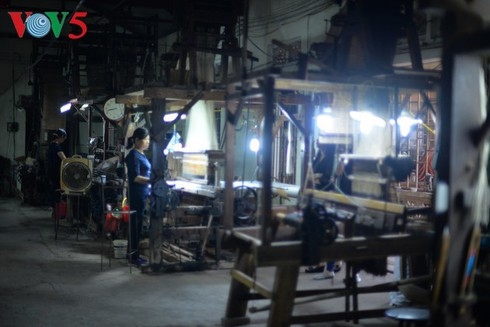Famous for its traditional crafts, Hanoi has the most craft villages in Vietnam with 1,350, accounting for nearly one-third of the country's total numbers. Their products are diverse and sophisticated and have firm footholds in foreign and domestic markets.
Hanoi’s craft villages have yet returned to full capacity since the Government loosened its COVID-19 restrictions on production activities.
    |
 |
|
A pottery workshop at Bat Trang village |
Famous villages like Phu Vinh rattan and bamboo village in Chuong My district, Ha Thai lacquer village and Quat Dong embroidery village in Thuong Tin district, and Chuon Ngo mother-of-pearl mosaic village in Phu Xuyen district are still trying to recover from the pandemic’s economic impact.
They have started making more of the products suited to domestic use like baskets, trays, and shopping bags and fewer of the decorative and souvenir items favored by European and American customers.
The pottery export markets of Bat Trang village in Gia Lam district are almost frozen. More than 80% of the Tan Thinh pottery workshop’s export orders have been cancelled.
Meritorious Artisan Tran Duc Tan, the workshop’s owner, elaborated “We are in extreme financial difficulty because many orders have been shipped to clients and we have not yet received payment. The domestic market—gifts ordered by businesses for events, for example—has also been affected.”
Nguyen Van Nghia’s pottery workshop is in a similar difficulty. “Big businesses which have enough human and material resources can resume production immediately. But small household businesses like us find it harder to restart,” Nghia explained.
To increase their competitiveness, many small businesses are improving their designs and product quality and learning how to market their products online.
Ha Van Lam, Deputy Head of the Representative Board of Bat Trang Pottery Village, said “We have encouraged traders at the Bat Trang pottery market to take responsibility for promoting their brands. Our mission is to main
    |
 |
|
A workshop at Van Phuc silk village in Hanoi |
tain our reputation, fight counterfeit, fake, or untraceable items and not to let them mingle with authentic Bat Trang items.”
Phu Yen leather and footwear village in Phu Xuyen district has resumed production since social distancing was relaxed, but isn’t at full capacity yet. Its production volume fell 50% this year.
In the past, Phu Yen village made only office shoes. Now it must diversify its products to include sports shoes, fashion shoes, and children's shoes.
To adapt to the new situation, production facilities in Van Phuc silk weaving village in Ha Dong district have re-organized their management, re-trained their workers, and boosted their online trading channels.
Source: VOV